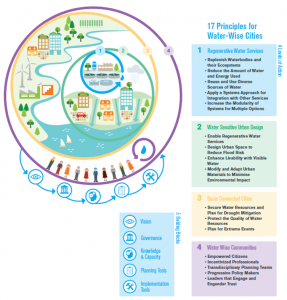The IWA’s Principles for Water Wise Cities: Developing a Shared Water Vision
Humanity cannot thrive and survive without water. Cities cannot function without water. A simple, but powerful reality. And yet, the pace of planning, innovation, governance, stakeholder collaboration and level of citizen engagement is slow and insufficient to satisfy the demands of increasingly complex urban water challenges. In this context, the International Water Association has developed the Principles for Water Wise Cities aiming at inspiring change amongst urban and local leaders and catalysing a shift in the current water management paradigm to make our cities more resilient and liveable.
For the first time in history, over half of the world’s population is living in cities. Not too long from now, by 2050, it is estimated that roughly 6.4 billion people – almost the planet’s current population – will live in a city. Rapid urban population growth, industrialisation, climate change-related risks, conflicts and natural disasters, problems in the renewal of existing assets and infrastructure, are just some of the factors unleashing unprecedented challenges to current urban water management and systems. Traditional paradigms are obsolete. And these challenges are exacerbated by the circumstances that exist in developing economies – how do we move from slums with no basic services, to sustainable urban water in Cities of the Future?
Urban and local leaders are witnessing, from the front lines, the increasing demands and challenges this new situation is creating. Uncertainty in the provision of water; improving living conditions, especially in slums and hazardous areas; ensuring safety from floods and natural disasters, while at the same time raising awareness for action so that local communities use water in a sustainable way. All these issues that urban and local water leaders are facing on a day-to-day basis have a profound impact on human well-being, health and safety, the environment, and the development and prosperity of cities. Urban leaders are challenged to go beyond enabling basic service provision and move towards resource stewardship, facilitating the active engagement of communities and extending their foresight beyond city boundaries to the basins that serve them.
The increasingly large number of people, concentrated in relatively small geographic areas, requires us to be more creative about how we use and protect our natural resources; and about how we manage water efficiently and share it among different users to minimise the use of resources. There is an opportunity to develop systems that protect our water resources and are adaptive to changing conditions, through more modularity and lower dependency on uncertain future resources. In the many cities that today lack governance, infrastructure and institutions to even provide basic services, transformative actions are needed to benefit from this opportunity. In the face of new socio-economic and climate related drivers, urban development pathways of the last century are no longer appropriate. Disruptive interventions that work at scale, despite the aforementioned weaknesses, that enable reuse, recovery and recycling of resources can and should be developed and implemented by water professionals.
The Principles for Water Wise Cities outlines a framework to assist urban leaders and water professionals to develop and implement their vision for sustainable urban water and resilient planning and design in their cities. The ultimate goal of the Principles is to encourage collaborative action, underpinned by a shared vision, so that local governments, urban professionals and individuals actively engage in addressing and finding solutions on urban water management challenges.
We need your involvement in creating more resilient cities as outlined in the IWA Principles for Water Wise Cities. We need to act collectively and act fast. Join us in the journey to water wise cities at the IWA World Water Congress & Exhibition’s urban pavilion (link to descriptive site on Brisbane website), powered by ARUP.


